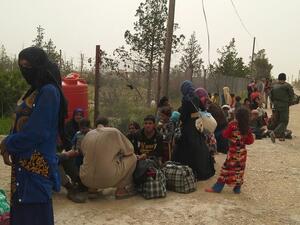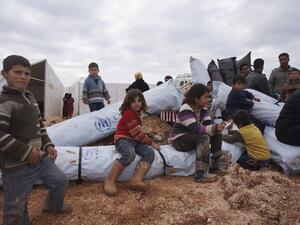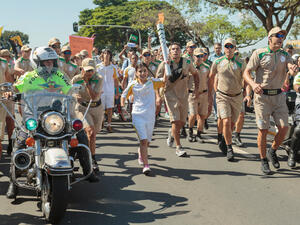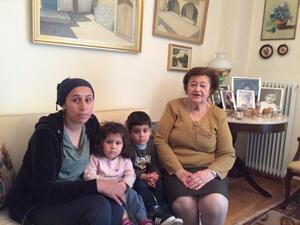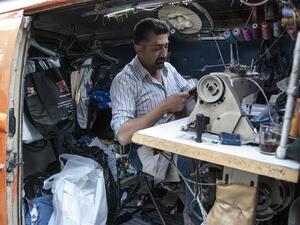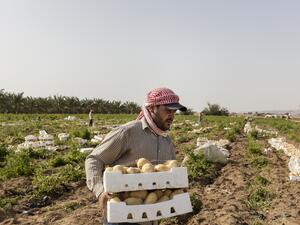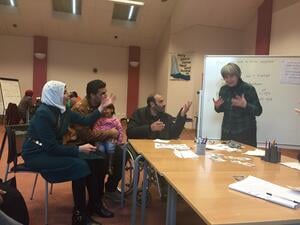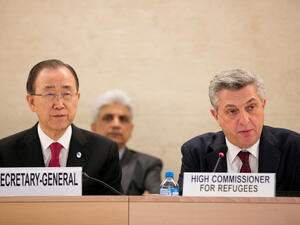More than 100,000 flee Syria in August, highest monthly total
More than 100,000 flee Syria in August, highest monthly total

A Syrian family gets a lift at a crossing to Lebanon where they will register at UNHCR centres.
GENEVA, September 4 (UNHCR) - The UN refugee agency said Tuesday that the number of refugees fleeing Syria rose sharply in August, with 103,416 people seeking asylum in surrounding countries. It was the highest monthly total of the Syria crisis to date and brought the total number of Syrian refugees registered or awaiting registration to more than 235,300.
UNHCR's chief spokesperson, Melissa Fleming, also told journalists in Geneva that Iraqi refugees in Syria continue to return to their country by the hundreds. "Most tell us they are leaving because of general insecurity, although some have reported direct threats," she said.
During the weekend a taxi used by Iraqi families to return to Iraq was hijacked, while UNHCR outreach workers said three Iraqi refugees were killed last week in the Damascus suburb of Jaramana, increasing fear among the refugee population there. According to the Iraqi government, 35,000 people returned to Iraq in July and August.
UNHCR and the Syrian Arab Red Crescent continue to expand operations to support displaced Syrians. The refugee agency has launched a programme of financial assistance for displaced families in Al Nabek, a town located between Damascus and Homs where large numbers of displaced people have sought safety.
Fleming said that 300 vulnerable families in Al Nabek received cheques on Monday which they will cash at local banks. "Based on experience of supporting Iraqi refugees, and feedback from displaced families, financial assistance is proving to be the most effective way of supporting vulnerable families in the constrained security environment in much of Syria," she said.
UNHCR and the Syrian Arab Red Crescent hope to expand this programme to 35,000 families (around 200,000 people) in the coming months. To date, 730 displaced families have benefitted, in addition to the 8,500 Iraqi refugee families (around 35,000 individuals) currently receiving financial assistance from UNHCR.
Among neighbouring countries, Iraq has seen a significant increase in the number of Syrian Kurds arriving in the past week, with an estimated 500 Syrians crossing a day, compared to 500 a week in the first three weeks of August. In the Kurdistan region, the authorities have agreed to work with UNHCR on a programme for urban refugees. They have also agreed to the establishment of a second camp, which will mainly accommodate Syrian Kurds. Elsewhere in Iraq there are reports of smaller numbers of Syrians arriving, including in Baghdad and Najaf.
In response to the large numbers of Iraqis electing to return to Iraq, the Iraqi Ministry of Displacement and Migration is expediting the registration process for returnees. This should enable returnees to receive government assistance for their reintegration in the coming weeks and months. UNHCR is assisting returnees with household items and will soon start a small cash assistance programme for the most vulnerable returnee families.
In Jordan, refugees continue to arrive at a rate of about 1,000 a day. There are reports of an increasing numbers of displaced people in southern Syria. The Jordanian government, UNHCR and partners are making preparations in the event of a large influx, bringing in relief items for 150,000 people.
In Lebanon, UNHCR is this week opening a mobile registration centre in Baalbeck in the eastern Bekaa Valley in response to the increasing number of displaced Syrians who are settling in the area. There are now more than 59,000 displaced Syrians who are registered or are awaiting registration with UNHCR in Lebanon. Of the registered population, 55 per cent are in the north of Lebanon and 42 per cent are in the Bekaa Valley.
"Host families are increasingly stretched in their capacity to host refugees and UNHCR is appealing to authorities in Lebanon to approve alternative shelter options," Fleming said in Geneva.
In addition some 180 families are staying in six schools due to open this month. Many are coming under pressure to move out. Yesterday a number of families were evicted from al-Marj school and UNHCR is seeking permission for them to return while alternative shelter is sought.
UNHCR and its partners have also been working hard to increase the enrolment of Syrian children in Lebanese schools - meeting with school directors and reaching out to refugee communities. They have also agreed to cover school fees and other expenses.
And in Turkey, the authorities say the country is hosting 80,410 Syrian refugees. Some refugees have returned to Syria reportedly due to a shift in conflict areas or because of concerns for their property amid rumours of looting. Many indicate that they may have to return to Turkey.
Meanwhile, there is still a backlog of Syrians waiting to be processed at the border with around 8,000 believed to be waiting to cross. They are being given food, water and medical assistance at the border and will be admitted to Turkey gradually. The government of Turkey continues to assure UNHCR that the borders will remain open to refugees.
In recent days, the government has moved more than 4,000 refugees staying in schools in several provinces to a new camp in Karkamis. Another camp was opened on Monday at Kahramanmaras and will host refugees staying in schools in southern Turkey and newly arrived refugees.

